Windtalkers Blu-ray Movie
HomeWindtalkers Blu-ray Movie 
Metro-Goldwyn-Mayer | 2002 | 134 min | Rated R | Nov 28, 2006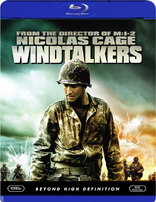
Movie rating
6.1 | / 10 |
Blu-ray rating
| Users | 3.7 | |
| Reviewer | 4.0 | |
| Overall | 3.7 |
Overview
Windtalkers (2002)
Marine Joe Enders is assigned to protect Ben Yahzee, a Navajo code talker, the Marines' new secret weapon, but if Yahzee should fall into enemy hands, he's to protect the code at all costs. Against the backdrop of the horrific Battle of Saipan, when capture is imminent, Enders is forced to make a decision: if he can't protect his fellow Marine, can he bring himself to kill him to protect the code?
Starring: Nicolas Cage, Adam Beach, Peter Stormare, Noah Emmerich, Mark RuffaloDirector: John Woo
| Action | Uncertain |
| War | Uncertain |
| Drama | Uncertain |
Specifications
Video
Video codec: MPEG-2
Video resolution: 1080p
Aspect ratio: 2.42:1
Original aspect ratio: 2.39:1
Audio
English: DTS-HD Master Audio 5.1 (48kHz, 24-bit)
French: Dolby Digital 5.1 (448 kbps)
Spanish: Dolby Digital 5.1 (448 kbps)
Subtitles
English, Spanish
Discs
25GB Blu-ray Disc
Single disc (1 BD)
Playback
Region A (locked)
Review
Rating summary
| Movie | 4.0 | |
| Video | 3.5 | |
| Audio | 4.5 | |
| Extras | 0.0 | |
| Overall | 4.0 |
Windtalkers Blu-ray Movie Review
A Better Tomorrow (But Not for a Hard-Boiled Killer)
Reviewed by Michael Reuben March 31, 2012Why review Windtalkers almost five and a half years after its release? Well, for one thing, it's an opportunity to assess how far the Blu-ray format has advanced since this very early disc (which, for some reason, did not receive an official site review at the time). For another, this John Woo film cries out for remastering, preferably in an edition that also contains Woo's director's cut, currently available only on DVD. Aside from its other merits, Windtalkers contains some of the most elaborately choreographed scenes of combat of which Woo is still the undisputed master, and it was the last film in which he would do almost everything as practical effects. Since then, Woo has moved to CGI with the rest of the film industry. Windtalkers is usually described as a story about the Navajo "codetalkers", whose encrypted communications based on their native tongue proved invaluable to the American war effort on the Pacific front in World War II, because it couldn't be broken. Certainly the script by John Rice and Joe Batteer (Blown Away) makes intriguing use of codetalkers as an entry point into the company of Marines assigned to take the island of Saipan from the Japanese, so that it can serve as a landing base for the next wave of aerial assault. But as usual, Woo's real subject is the complex relationship between men who are both linked together and torn apart by circumstances and their own weaknesses—and frequently by guilt over past misdeeds. It's no accident that the two main characters of Windtalkers share a Catholic background: Joe Enders, the white Marine, is a lapsed Catholic, and Ben Yahzee, the Navajo codetalker, was educated in a Catholic school. Woo, himself a Catholic, has long been preoccupied with sin, forgiveness and expiation through blood, suffering and sacrifice. These themes sound strongly in Windtalkers, which, for that reason, feels much more like a generic war film than would any World War II film made by an American celebrating the Greatest Generation.

In Arizona, a group of Navajo men say goodbye to their loved ones as they depart to be trained as Marine codetalkers. Among them are Ben Yahzee (Adam Beach), who has a wife and young son, and his friend Charlie Whitehorse (Roger Willie). In the Pacific, a Marine named Joe Enders (Nicolas Cage) is the sole survivor of a horrific battle. Enders will receive a medal and promotion to sergeant, but only after a long recuperation in a military hospital in Hawaii, where he is haunted by memories of the battle. A nurse named Rita (Frances O'Connor) tries to draw him out, but ends up falling victim to a kind of reverse Florence Nightingale syndrome. Though Enders has lost most of the hearing in one ear, Rita helps him fake his way through a hearing test so that he can go back to active duty, because that's what he wants. As Enders' personal history emerges, it becomes clear that war is the only thing he's ever been good at. And despite Rita's obvious interest, right now all he cares about is killing more "Japs". Returned to duty, Enders is given a job he doesn't want, which is to shadow Yahzee and guard him. But off the record, Enders is given a classified order, which is to protect the code at all costs. The enemy's best hope of breaking the new code is to capture a codetalker and torture a decryption guide out of him. To prevent that, Enders and every other "shadow" assigned to a codetalker is handed the heavy responsibility of killing his charge, if there's no other option to avoid capture. The marine assigned to Whitehorse, Sergeant Pete Anderson (Christian Slater), isn't sure he could do it. Neither is Enders. This isn't why he went back into the field. The complex and often tortured relationship between Enders and Yahzee is the film's true subject, and it clearly intrigues Woo far more than how the battle for the Pacific was transformed by the Navajo code, which is treated in an almost perfunctory manner (although, if you stop and think, it's not hard to grasp the advantage gained by American forces who could adapt battle tactics on the fly without the enemy having any ability to eavesdrop and compensate). While the relationship between the battle-hardened veteran and the green newcomer has a familiar ring to it, Enders and Yahzee remain separated by the former's awareness of his secret orders and also by his guilty demons that turn every battle into a rampage of personal vengeance. As much as Yahzee keeps trying to reach out to Enders, there are moments when he finds him as frightening and mysterious as the enemy. Whitehorse and Anderson, by contrast, connect almost immediately; before long, they are playing duets on harmonica and traditional Navajo pipe, two instruments that should be incompatible. Woo has always been fascinated by dualities—cop and criminal are his most typical recurring pair, whether in the Hong Kong films or in mainstream American fare like Face/Off—but he's also said that he knows "how to shoot the hero" (the pun may or may not be intentional). In Enders and Yahzee, he shows two different aspects of heroism. Yahzee, who is a decent family man trying to do the right thing, lacks the killer instinct that war often requires precisely because he is so decent; this makes him a hero for the long term. But wars can't be waged, and battles can't be won, without doomed souls like Enders, who, as his major (Jason Isaacs) points out, was never comfortable in civilian life. The challenge for Enders is what to do when he's not fighting. It's a question that becomes more insistent with each letter from Nurse Rita that manages to reach him at the front. In the tradition of all good war films, Enders and Yahzee are surrounded by a cross-section of comrades whose different characters and backgrounds twist and pull on different portions of the already complex dynamic between them, including Private Chick (Noah Emmerich), a racist whose grandfather used to hunt Native Americans; Private Pappas (Mark Ruffalo), a live-and-let-live city dweller; Private Nellie (Martin Henderson), who just wants to get back to his wife; Private Harrigan (Brian Van Holt), who's an eternal optimist; and a gunnery sergeant, Hjelmstad (Peter Stormare), who provides the requisite bluster. But everything always comes back to Enders and Yahzee, who by the end of the film have become the closest of friends, because they literally have no choice in the matter.
Windtalkers Blu-ray Movie, Video Quality 
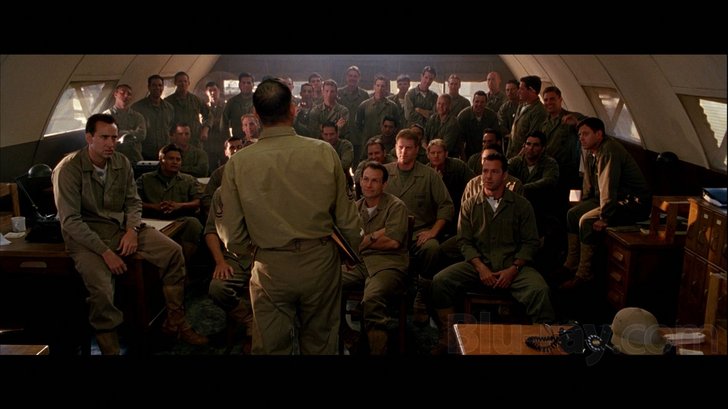
From the opening shots of the mountains of the Sonoran Desert, the limitations of the MPEG-2 codec used on MGM's 1080p Blu-ray of Windtalkers are obvious. Even though the shots are reportedly stock footage, the lack of fine detail in what should be breathtaking vistas is readily apparent. The same lack is notable in long shots throughout the film, although Woo is such a master of choreographed mayhem that eventually the viewer simply surrenders to the experience and stops noticing the shortcomings. Shortcomings nevertheless remain in the fine textures of clothing, faces, vegetation, dirt, indeed just about anywhere one chooses to focus. Just how much of the deficiency is due to the limitations of MPEG-2 encoding, and how much can be attributed to pre-compression filtering necessary to accommodate the film on a BD-25, is impossible to say. A film of this length and with such demanding action sequences required a BD-50, and certainly needed an advanced codec such as AVC. Still, considering the technical limitations under which MGM was laboring at the early stage of Blu-ray's existence, they produced a watchable image. Compression artifacts and macroblocking did not appear to be an issue, although such phenomena might become evident on large-format front-projection systems. Nor were there any scenes plagued by the kind of video noise that were the bane of MPEG-2 in the early days of DVD. Given the low price at which Windtalkers can now be acquired, if you find yourself double-dipping for an improved edition somewhere down the line, you won't have wasted your money on this version.
Windtalkers Blu-ray Movie, Audio Quality 
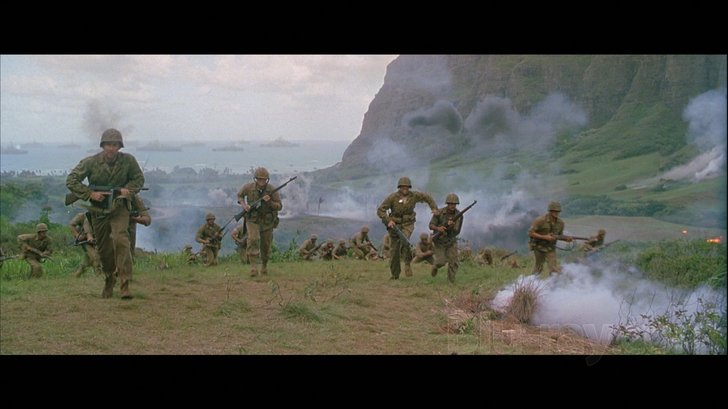
The DTS-HD MA 5.1 track is no doubt the main reason why Windtalkers was selected for an early release on Blu-ray, because it's a showcase for the format's audio virtues. (The 5.1 mix was impressive on DVD as well.) Indeed, the setup menu is something of a historical curiosity, because it includes the word "lossless" in parentheses, as a reminder that in those days people needed to be told what this new form of DTS was. Woo's Hollywood films (and his Chinese films since learning the Hollywood style) are renowned for their energetic soundtracks, and Windtalkers is especially bombastic, as the sound designers try to out-Ryan Steven Spielberg in re-creating the hell of battle. Explosions, mortar fire, machine guns, artillery, aerial bombardment and all manner of small arms burst, kick and boom from all sides with relentless punch and impact. If you're not careful where you set your volume, your hearing may end up as badly damaged as that of Sergeant Enders. The quieter portions in between the mayhem are well-balanced, though, so that it shouldn't be necessary to raise the volume to catch the dialogue between the soldiers as they deal with the anticipation and aftermath, each in his own way. James Horner's typically fine score has been appropriately mixed so that it sometimes blends in smoothly with the action and at other times rises above it, like the cosmic commentary that one frequently finds in Woo's best films.
Windtalkers Blu-ray Movie, Special Features and Extras 
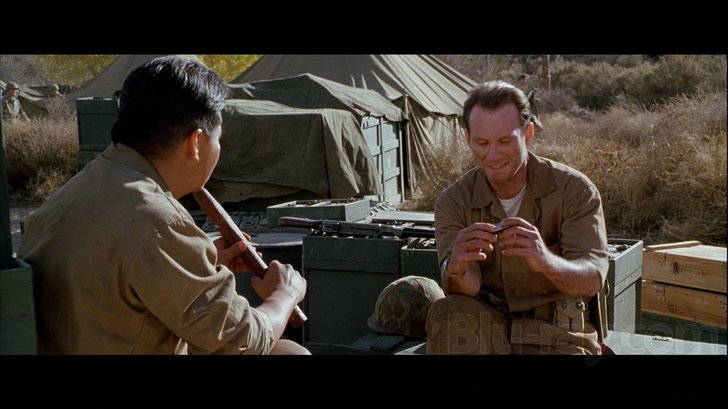
Not surprisingly, given the demands of fitting a 134-minute film onto a BD-25, the disc has no supplements, not even a trailer.
Windtalkers Blu-ray Movie, Overall Score and Recommendation 
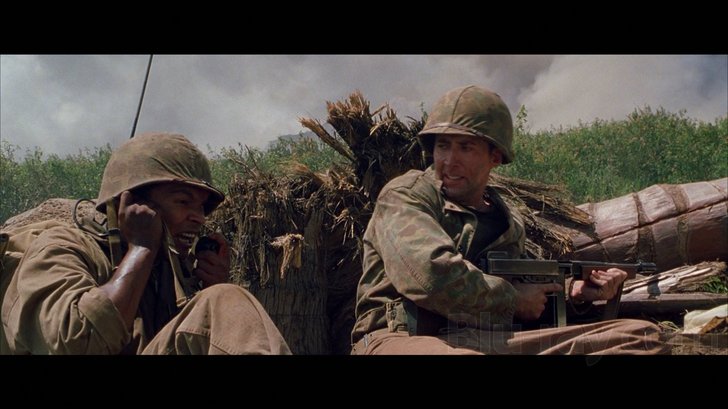
Windtalkers was not a box office success, and I've always attributed that to a marketing campaign that raised false expectations. Audiences arrived expecting to see a film about codetalkers, and instead they experienced a bizarre hybrid of The Killer and Sands of Iwo Jima. Woo, I suspect, never fully grasped the American veneration of the Greatest Generation, certainly not in the same way that he responded at a deeply intuitive level to the stories from his childhood that he would go on to immortalize in Red Cliff. But he knew how to shoot the hero, and Windtalkers remains an effective drama. We just need a new version, properly mastered and encoded and preferably with both the theatrical cut and Woo's director's cut.
Other editions
Windtalkers: Other Editions
Similar titles
Similar titles you might also like

Red Tails
2012

Flyboys
2006

We Were Soldiers 4K
2002

Fury 4K
2014

The Great Raid
Unrated Director's Cut
2005

A Bridge Too Far
1977

Hacksaw Ridge 4K
2016

Stalingrad 3D
Сталинград
2013

Flags of Our Fathers
2-Disc Special Edition
2006

Fortress
2011

12 Strong
2018

Company of Heroes
2012

Midway
2019

Black Hawk Down 4K
2001

U-571 4K
25th Anniversary Edition
2000

Saints and Soldiers: The Void
2014

Tears of the Sun
2003

Saints and Soldiers: Airborne Creed
2011

The Patriot
Extended Cut
2000

5 Days of War
2011

